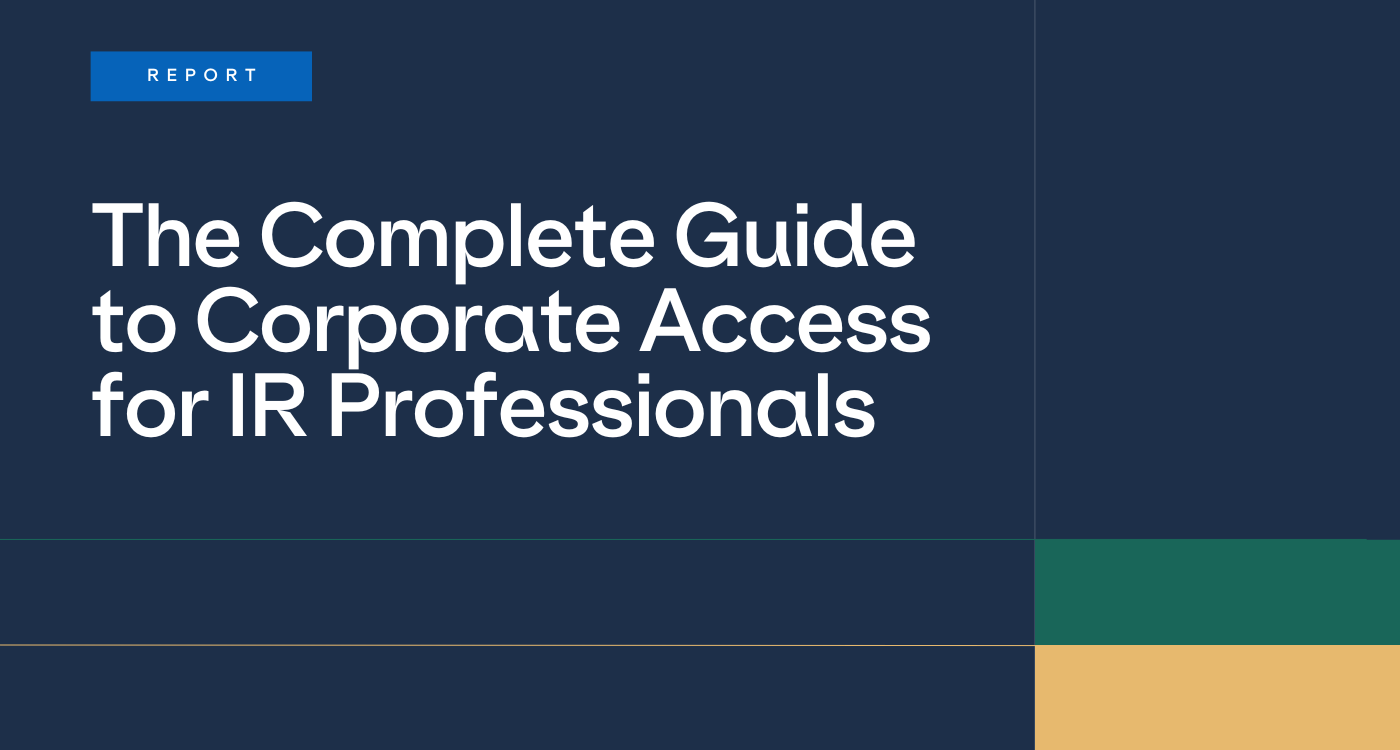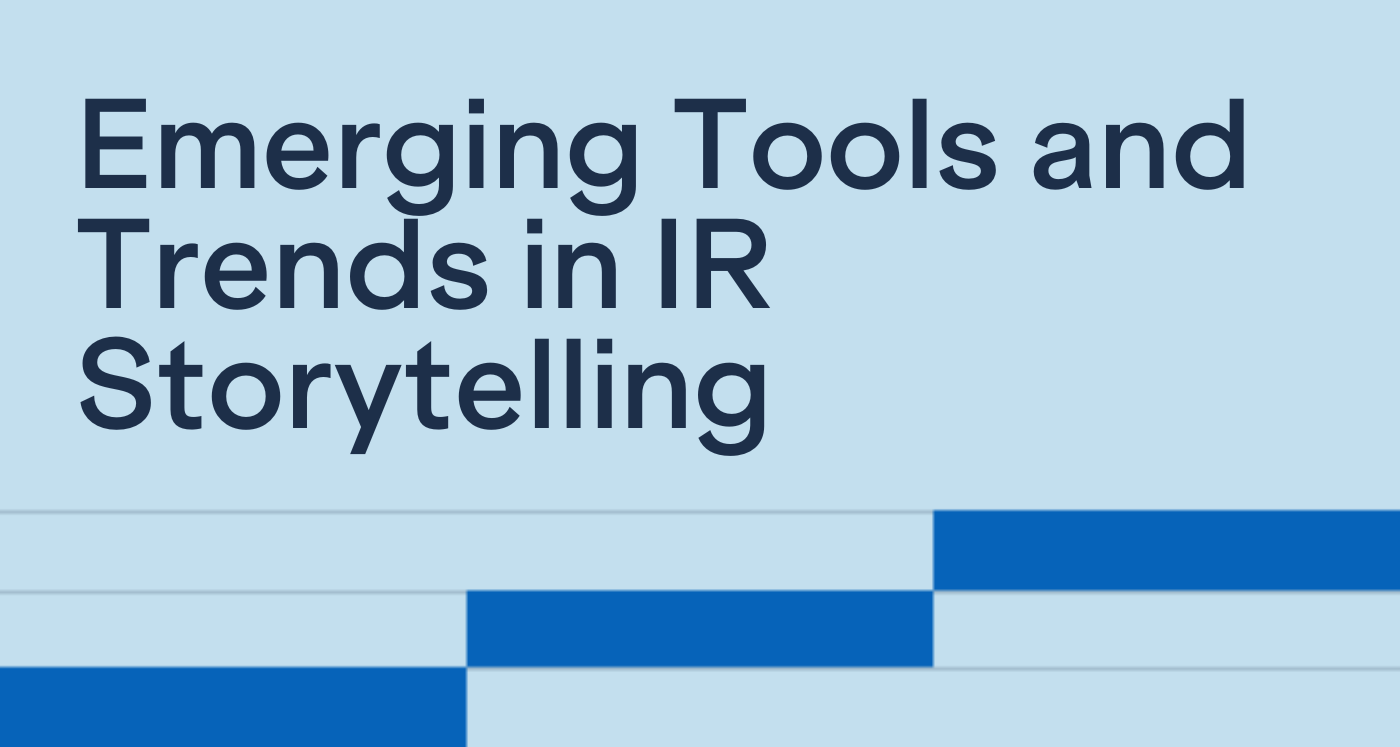
The Complete Guide to Corporate Access for IR Professionals
Download The Complete Guide to Corporate Access for IR Professionals: Strategic Insights for Building Meaningful Investor Relationships

The last decade has seen a boom in retail investors entering the market. With growing access to corporate records, online finance communities, and low or no commission investing apps, it’s easier than ever for individual investors to take a position in your stock.
According to research from the World Economic Forum in 2022, retail investors own approximately over 50% of global AUM. Furthermore, over 53% of American families hold stocks according to the SEC.
Retail investors have the power to move markets, and yet many corporations do not actively engage with their retail investors. For many, part of the aversion to engaging retail investors has to do with access; while institutional investors are easier to identify and track positions, the lack of transparency in the retail market makes it difficult to track individual investors. Luckily, as modern trading has evolved so has the ability to access your retail investor base.
Read on to discover some of the advantages of engaging retail investors, how to access retail investor data, and how you can leverage that information to earn higher valuations.

While the capital used by retail and institutional investors is the same, there are a few key differences in the ways these groups invest.
Despite myths about frequent trading or having a “pump and dump” mentality, research has shown that most retail investors typically trade less often and are often more loyal to the companies they invest in. This means they can bring a welcome stability when compared to professional investors, who are likely to be more active traders. This stability can have a positive impact on company valuations.
There is also the perception that retail investors don’t care about voting. Jeff Lambert, Founder and CEO at Tiicker and CEO of Lambert surmises that the reason they don’t vote is due to a lack of engagement and not a lack of interest.
“As the retail audience has got larger, it's over 30 percent of trading volume last year, and continues to be a large chunk of public company ownership, it's important to engage this audience for a few reasons. One is because of their size. As a group, they have the ability to influence things like votes.
And so, while a small percentage of them vote, a large percentage of them could, and they represent a really nice piece. I think that's the misnomer is that, they're out there and they don't care.
They do care, they just don't know that the public company has information. It's never invited them into a relationship. About eight in ten retail investors vote with management. To ignore retail investors is at your own peril.”
The last thing to note about retail investors is that they don’t always have access to the same tools and privileges institutional investors have. Retail investors may lack access to financial reports, and are usually unable to snap up shares until institutional investors have had their fill. As a result, retail investors typically favor well known stocks, or brands and companies that they recognize through being customers. That doesn’t mean that smaller companies can’t attract individual investors; on the contrary, a retail engagement strategy with an emphasis on proactive communication can unlock value from the underserved retail investor segment.
While it may seem like targeting retail investors is like going after a small fish in a big pond, it’s important to note that your targeting strategy is more like going after the whole shoal of fish. You don’t have to be targeting the individual at the granular level, instead you can target retail investors as a collective. Retail investors make up a large segment of the stock market, with the latest data from the US Federal Reserve suggesting that retail investors collectively own over $34T USD in stocks.
Although the importance of retail investors is clear, the challenging part is earning, engaging, and retaining your retail shareholders. You don’t have to be a FAANG company to attract retail investors. These days there are more avenues than ever for retail investors to invest in your company. While the SEC is making strides to help retail investors make informed choices, the onus is on your company to make informational materials accessible to retail investors. Some strategies you can use to nurture your retail shareholder base include tracking NOBOs, hosting retail investor events, and using a dedicated IR CRM.
NOBOs, or Non-Objecting Beneficial Owners, are your shareholders who have agreed to share their contact and ownership information with issuers. While it may seem easier to interact exclusively with brokers and institutions, NOBOs represent an excellent opportunity to get in front of retail shareholders directly. Tracking the NOBO share movement is also a great way to gauge retail investor sentiment.
Knowing which NOBOs have large positions in your company can help you understand your shareholder demographics, improve your shareholder relationships, and allow for the orderly selling of blocks of shares. After all, it’s easier to convince an existing shareholder to buy more shares than it is to find new investors.
According to Mike McAllister, VP of Investor Relations at Sierra Metals:
"Simply put, without something in place like Irwin's NOBO Solution, you're missing a large part of your shareholder base. You don't even know that they're there - you're missing opportunities for people who are willing to buy or increase their positions to support your stock.”
Once you’ve identified some of your retail shareholders, the next step is to engage them. While visiting all your retail investors during roadshows might be extreme, the proliferation of online webcasting solutions makes it easier than ever to get in front of retail investors no matter where in the world they live. Running a virtual roadshow can help you get in front of a wide audience of existing and potential retail investors.
Karen Keyes, Head of Investor Relations at Canadian Tire Corporation, supports making your AGM and certain investor events available to retail audiences.
“We look at our capital allocation messaging with a view that a lot of retail investors will read it, and then events like the AGM and investor day we typically have a high participation from retail investors. So use those platforms as a way to communicate more broadly.”
Learn more about the Best Practices For Managing Investor Expectations.
Additionally, having a proper IR CRM allows you to better keep track of institutional, retail, and NOBO investors. By keeping all your contacts organized in a dedicated IR CRM you can proactively send your retail investors pertinent information with a quick and easy mail merge. You can use this to keep your investors abreast of corporate governance changes, company catalysts, quarterly reports, and upcoming virtual events. This allows you to keep an open line of communication with your retail investors without having to track each one individually.
Keeping track of your retail investor relations may seem overwhelming, but with the right tools it can be a powerful way to tap into an underserved shareholder base.
Learn more about retail investors and how to engage them.

Download The Complete Guide to Corporate Access for IR Professionals: Strategic Insights for Building Meaningful Investor Relationships

Wall Street's expectations for sophisticated storytelling are higher than ever. Learn how Investor Relations experts are answering the call.

Compelling IR storytelling is a skill you can learn and strengthen — combining structured messaging, audience adaptation, and more.